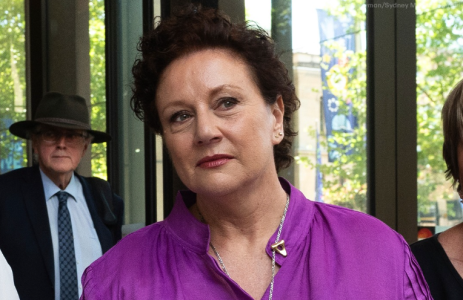You won’t believe who gets $2 million payout after wrongful conviction
By
Gian T
- Replies 0
It’s a story that has gripped the nation for decades, and now it has taken a dramatic new turn.
A woman once branded 'Australia’s worst female serial killer' will receive a $2 million payout from the government after enduring 20 years in prison for crimes she did not commit.
Her release and now this compensation mark a stunning reversal in one of the country’s most infamous miscarriages of justice.
For those who may not recall, Kathleen Folbigg was convicted in 2003 of killing her four children—Caleb, Patrick, Sarah, and Laura—between 1989 and 1999.
The case was one of the most controversial in Australian legal history, with the deaths of her children initially attributed to smothering.
The prosecution’s case relied heavily on circumstantial evidence and the now-infamous diary entries, which were interpreted as confessions of guilt.
But as the years passed, the scientific community began to question the verdict. New research in genetics and cardiology revealed that the children may have died from natural causes linked to rare genetic mutations.
After two major inquiries and mounting pressure from scientists and advocates, Folbigg was finally released in June 2023, her convictions quashed and her name—at least in the eyes of the law—cleared.
Now, in a move that echoes some of Australia’s most high-profile wrongful conviction cases, the NSW government has agreed to pay Folbigg an ex gratia sum—meaning a one-off, discretionary payment, not determined by a court.
While the exact amount was meant to be confidential at Folbigg’s request, it’s widely reported to be around $2 million.
Attorney-General Michael Daley said the decision came after 'thorough and extensive consideration' of the evidence and submissions from Folbigg’s legal team.
The payout is intended to compensate her for the 20 years she lost to a wrongful conviction, the trauma she endured, and the damage to her reputation.
Folbigg’s case now sits alongside other infamous Australian miscarriages of justice. Lindy Chamberlain, who was wrongly convicted of killing her baby Azaria at Uluru in 1980, received $1.3 million in compensation in 1992.
More recently, Scott Austic, a West Australian man acquitted of murder after 13 years in prison, was awarded $1.55 million.
In contrast, David Eastman, who spent 19 years in jail for a murder he didn’t commit, received a court-ordered $7 million payout.
But as many legal experts and advocates point out, no amount of money can truly compensate for the years lost, the stigma endured, and the pain suffered by those wrongfully imprisoned.
Folbigg’s lawyer, Rhanee Rego, described the claim as including a detailed account of her 24-year ordeal, evidence of government errors, and expert assessments of her losses.
The payout also raises broader questions about how Australia handles wrongful convictions. Ex gratia payments are rare, and there’s no standard formula for how much is awarded.
Unlike court-ordered damages, these payments are at the government's discretion, often decided behind closed doors by state cabinets.
This lack of transparency and consistency has led to calls for a national compensation scheme for the wrongfully convicted.
For Folbigg, the payout is a bittersweet victory. She’s free, her name has cleared, and she’ll have some financial security after decades of hardship. But the scars of her ordeal will likely remain for life.
Her case is a stark reminder of the fallibility of our justice system—and the importance of scientific progress in righting past wrongs.
 Do you think $2 million is enough for 20 years lost? Should there be a national standard for compensating the wrongfully convicted? And do you remember following the Folbigg case over the years? Share your opinions and stories in the comments below.
Do you think $2 million is enough for 20 years lost? Should there be a national standard for compensating the wrongfully convicted? And do you remember following the Folbigg case over the years? Share your opinions and stories in the comments below.
Read more: Online romance tricks Aussie grandma, nearly lands her in prison
A woman once branded 'Australia’s worst female serial killer' will receive a $2 million payout from the government after enduring 20 years in prison for crimes she did not commit.
Her release and now this compensation mark a stunning reversal in one of the country’s most infamous miscarriages of justice.
For those who may not recall, Kathleen Folbigg was convicted in 2003 of killing her four children—Caleb, Patrick, Sarah, and Laura—between 1989 and 1999.
The case was one of the most controversial in Australian legal history, with the deaths of her children initially attributed to smothering.
The prosecution’s case relied heavily on circumstantial evidence and the now-infamous diary entries, which were interpreted as confessions of guilt.
But as the years passed, the scientific community began to question the verdict. New research in genetics and cardiology revealed that the children may have died from natural causes linked to rare genetic mutations.
After two major inquiries and mounting pressure from scientists and advocates, Folbigg was finally released in June 2023, her convictions quashed and her name—at least in the eyes of the law—cleared.
Now, in a move that echoes some of Australia’s most high-profile wrongful conviction cases, the NSW government has agreed to pay Folbigg an ex gratia sum—meaning a one-off, discretionary payment, not determined by a court.
While the exact amount was meant to be confidential at Folbigg’s request, it’s widely reported to be around $2 million.
Attorney-General Michael Daley said the decision came after 'thorough and extensive consideration' of the evidence and submissions from Folbigg’s legal team.
The payout is intended to compensate her for the 20 years she lost to a wrongful conviction, the trauma she endured, and the damage to her reputation.
Folbigg’s case now sits alongside other infamous Australian miscarriages of justice. Lindy Chamberlain, who was wrongly convicted of killing her baby Azaria at Uluru in 1980, received $1.3 million in compensation in 1992.
More recently, Scott Austic, a West Australian man acquitted of murder after 13 years in prison, was awarded $1.55 million.
In contrast, David Eastman, who spent 19 years in jail for a murder he didn’t commit, received a court-ordered $7 million payout.
Folbigg’s lawyer, Rhanee Rego, described the claim as including a detailed account of her 24-year ordeal, evidence of government errors, and expert assessments of her losses.
The payout also raises broader questions about how Australia handles wrongful convictions. Ex gratia payments are rare, and there’s no standard formula for how much is awarded.
Unlike court-ordered damages, these payments are at the government's discretion, often decided behind closed doors by state cabinets.
This lack of transparency and consistency has led to calls for a national compensation scheme for the wrongfully convicted.
Her case is a stark reminder of the fallibility of our justice system—and the importance of scientific progress in righting past wrongs.
Key Takeaways
- Kathleen Folbigg, who was wrongfully convicted of killing her four children and spent two decades in prison, will receive a compensation payment from the NSW government.
- While Folbigg requested most details be kept private, it’s understood her ex gratia payment is about $2 million after her convictions were overturned due to new scientific evidence.
- Ex gratia payments like Folbigg’s are rare, decided by state cabinet, and differ from court-awarded damages; other high-profile cases include Lindy Chamberlain and Scott Austic.
- Folbigg’s compensation claim included details about her long ordeal, government errors, and independent assessments of her loss; her convictions were quashed after evidence from genetics and cardiology experts.
Read more: Online romance tricks Aussie grandma, nearly lands her in prison








